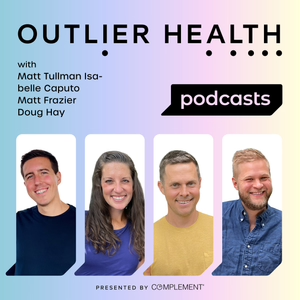
#19: Microplastics— The Silent Intruder in Our Lives and Health
01/09/25 • 11 min
Microplastics, the tiny yet pervasive fragments infiltrating our air, water, food, and bodies, pose a significant threat to both our health and the environment.
In this episode, we break down where they come from, their alarming presence in our daily lives, their impact on human health, and simple, actionable strategies to reduce exposure and contribute to a healthier planet.
Top 3 Actionable Takeaways
- Drink Smart: Use filtered water over bottled water to reduce microplastic intake.
- Opt for Natural: Choose clothing and textiles made from organic cotton or wool instead of synthetic materials.
- Minimize Plastic Use: Store food in glass or stainless steel containers and avoid microwaving plastic to limit exposure.
Let’s Connect:
Work with me: Premier Cardiovascular Health
Facebook: https://www.facebook.com/chris.huff.9480
Instagram: @hufcm
Disclaimer: The information provided in this podcast is for educational and informational purposes only and is not intended as medical advice. Always consult with a qualified healthcare provider before making any decisions about your health or medical treatment.
Microplastics, the tiny yet pervasive fragments infiltrating our air, water, food, and bodies, pose a significant threat to both our health and the environment.
In this episode, we break down where they come from, their alarming presence in our daily lives, their impact on human health, and simple, actionable strategies to reduce exposure and contribute to a healthier planet.
Top 3 Actionable Takeaways
- Drink Smart: Use filtered water over bottled water to reduce microplastic intake.
- Opt for Natural: Choose clothing and textiles made from organic cotton or wool instead of synthetic materials.
- Minimize Plastic Use: Store food in glass or stainless steel containers and avoid microwaving plastic to limit exposure.
Let’s Connect:
Work with me: Premier Cardiovascular Health
Facebook: https://www.facebook.com/chris.huff.9480
Instagram: @hufcm
Disclaimer: The information provided in this podcast is for educational and informational purposes only and is not intended as medical advice. Always consult with a qualified healthcare provider before making any decisions about your health or medical treatment.
Previous Episode

#18: The Basics of Exercise Physiology and Metabolism
As we move through the holiday season, it’s easy to let fitness routines fall by the wayside. But understanding how your body uses energy can reignite your motivation and set the stage for better performance, endurance, and health in the new year.
In this episode, Dr. Huff takes us through the science of energy production, explaining how adenosine triphosphate (ATP) acts as the "currency" powering every movement.
Takeaway—Example Training Plan
Building a fitness routine that targets all energy systems is essential for metabolic flexibility. A sample week might include:
- Monday: Zone 2 cardio (60–90 minutes at 60–70% max heart rate or 3-4 RPE)
- Tuesday: Interval training (30 minutes, high intensity)
- Wednesday: Active recovery (yoga, walking)
- Thursday: Zone 2 cardio (60-90 minutes)
- Friday: Tempo or intervals training
- Saturday: Long-duration Zone 2 cardio (90-120 minutes)
- Sunday: High-intensity interval training or rest depending on level of fatigue
Let’s Connect:
Work with me: Premier Cardiovascular Health
Facebook: https://www.facebook.com/chris.huff.9480
Instagram: @hufcm
Disclaimer: The information provided in this podcast is for educational and informational purposes only and is not intended as medical advice. Always consult with a qualified healthcare provider before making any decisions about your health or medical treatment.
Next Episode

#20: The Four Pillars of Mental Fortitude
Dr. Huff shares a deeply personal story of navigating two simultaneous medical emergencies while reflecting on what enabled him to stay composed under pressure.
It wasn’t a lack of stress but years of preparation that allowed him to act with clarity. This experience brought home a powerful truth: mental fortitude is a skill anyone can develop.
By exposing ourselves to different kinds of stress—physical, emotional, environmental, and mental—we can build resilience that transcends life’s challenges.
Resources Mentioned
- Dr. Biff Palmer: Renowned for his resilience and accomplishments, including climbing Mount Everest. Listen to this episode.
- Allison Grubb: Known for her mental toughness and completing GoRuck Selection, one of the toughest endurance challenges. Listen to this episode.
- General Frank Merritt: Credited with the quote, “Good training provides a focused alternative to panic.”
- Vince Lombardi: His timeless quote, “Fatigue makes cowards of us all,” underscores the importance of building resilience.
Top 3 Takeaways
- Expose Yourself to Varied Stressors: Engage in activities that challenge you physically, emotionally, environmentally, and mentally, gradually increasing their intensity.
- Track Your Progress: Keep a journal of your daily stressors and responses to identify growth areas and celebrate successes.
- Embrace Failure and Rejection: Seek opportunities to fail or face rejection intentionally—it’s a powerful way to build emotional resilience.
Let’s Connect:
Work with me: Premier Cardiovascular Health
Facebook: https://www.facebook.com/chris.huff.9480
Instagram: @hufcm
Disclaimer: The information provided in this podcast is for educational and informational purposes only and is not intended as medical advice. Always consult with a qualified healthcare provider before making any decisions about your health or medical treatment.
If you like this episode you’ll love
Episode Comments
Generate a badge
Get a badge for your website that links back to this episode
<a href="https://goodpods.com/podcasts/premier-cardiovascular-health-and-performance-podcast-636596/19-microplastics-the-silent-intruder-in-our-lives-and-health-84805767"> <img src="https://storage.googleapis.com/goodpods-images-bucket/badges/generic-badge-1.svg" alt="listen to #19: microplastics— the silent intruder in our lives and health on goodpods" style="width: 225px" /> </a>
Copy




